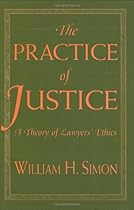The Practice of Justice: A Theory of Lawyers' Ethics

| Author | : | |
| Rating | : | 4.59 (652 Votes) |
| Asin | : | 0674697111 |
| Format Type | : | paperback |
| Number of Pages | : | 264 Pages |
| Publish Date | : | 2013-05-02 |
| Language | : | English |
DESCRIPTION:
Aiming at nothing less than a radical rethinking of lawyer's ethics, it proposes a new conception of our professional responsibilities and challenges us to examine critically the conventional norms of our professional role. Altman New York Law Journal. Along the way, it explores the scope and underpinning of our loyalty to clients, our obligations to protect the rights of third parties and our duty to promote justiceSimon's writing is lucid, well-organized and jargon-freeThe cogency of his critique of the dominant viewshakes the grounds on which we currently practiceThus, Simon's work is profoundly unsettling, even disorienting, both intellectually and emotionally. (James M. Therein lies its enormous value. Though slender and unpretentious, William Simon's new book, The Practice of Justice, packs a wallop
Horrifying I. Murphy One of the worst ethics books I have ever read. It was extremely difficult to finish this book, mostly because the arguments made in one section is refuted in the other. He doesn't make sense most of the time. His reasoning is weak at best. At one point (Chapter 7), he refutes an argument because it is "silly." No further elaboration!
William Simon, a legal theorist with extensive experience in practice, charges that the profession's standard approach to these questions is incoherent and implausible. Rather, Simon shows that the critical weakness of the standard approach is its reliance on a distinctive style of judgment--categorical, rule-bound, rigid--that is both ethically unattractive and rejected by most modern legal thought outside the realm of legal ethics. Nor does it arise from the adversary system. Should a lawyer keep a client's secrets even when disclosure would exculpate a person wrongly accused of a crime? To what extent should a lawyer exploit loopholes in ways that enable clients to gain unintended advantages? When can lawyers justifiably make procedural maneuvers that defeat substantive rights? The Practice of Justice is a fresh look at these and other traditional questions about the ethics of lawyering. The problem, he insists, does not lie in the profession's commitment to legal values over those of ordinary morality. The author enlivens his argument with discussions of actual cases, including the Lincoln Savings and Loan scandal and the Leo Frank murder trial, as well as fictional accounts of lawyering, including Kafka's The Trial and the movie The Verdict.. He develops an alterna
Simon is Kenneth and Harle Montgomery Professor of Public Interest Law at Stanford University. William H.
